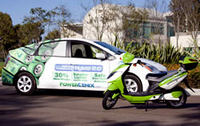New Nickel Zinc Battery Technology On the Way
See Also: EV-Motoring.Com
By Rex Roy
Detroit Bureau
Senior EV Editor
The Auto Channel
Detroit Janyuary 14, 2009; Surprisingly, it's been nearly two decades since the last major advance in battery technology. For non-geeky battery types, this would have been the commercialization of the Lithium Ion cell. This battery type remains the industry's standard for pure electric vehicles because it can deliver more power over a longer period of time at a lower cost than any competitive technology.
However, for what the automotive industry refers to as High Efficiency Vehicles (HEVs) — what we call conventional hybrids — a new battery technology is on the horizon that will make these vehicles less costly, less weighty, and even more green (in terms of battery pack recyclablility).
The new technology comes from the California company PowerGenix. The company holds 23 patents (granted and pending) on Nickel-Zinc batteries. The base formulation for NiZn batteries isn't new (Thomas Edison attempted but gave up on making the formulation work), but as PowerGenix CEO, Dan Squiller noted, "What the engineers and chemists at PowerGenix discovered was how to make the elements play nice together and last for an extended period of time while charging and discharging."
Currently, HEVs use Nickel Metal Hydride batteries. The new NiZn formulation packs 30-percent more power into a package that weighs 30-percent less than NiMH power cells. On top of this, the PowerGenix cells cost 20-percent less. The company has retrofitted a Toyota Prius with their batteries, and report solid results from the lighter vehicle.
In spite of this success, don't look for PowerGenix brand batteries to be on sale at your local Radio Shack or under the hood of a Toyota Prius anytime soon. While the company already manufacturers their NiZn cells for use in power tools, electric scooters, electric bikes, and for companies selling rechargeable AA and AAA batteries (check out the NiZn cells at Ritz Camera), PowerGenix has opted not to create a brand name for their batteries (they don't want to take on the big-spending bunny). Regarding automotive applications, PowerGenix plans to license their technology.
According to Squiller, the company's batteries will be used in automotive applications (HEVs) in the foreseeable future, but probably not sooner than 2011 models. "We expect that HEVs will become a standard of sorts in the next few years," Squiller said as he referenced the expansion of the "auto stop" feature on vehicles with standard internal combustion engines. "These vehicles represent the perfect application of Nickel Zinc battery technology, because they need bursts of power for short durations and this is something that our batteries do very well."
When a vehicle goes into the "auto stop" mode, the engine shuts down, but all accessories stay running. As in some GM hybrids (the Saturn Vue and Chevrolet Malibu, for example), a helper electric motor can also add torque to the internal combustion engine. NiZn batteries will supply the power for these applications. Squiller wouldn't comment on which automotive manufactures might first use PowerGenix NiZn technology, but the CEO hinted that it would be a company known for its "aggressive" pursuit of environmental technologies. Our bet is Honda and/or Mercedes.
As HEVs become more popular, there will also be a need to deal with the "dead" battery packs, and NiZn units are readily recyclable.
EV-Motoring.com will keep you posted on future battery technology updates as they become available.



